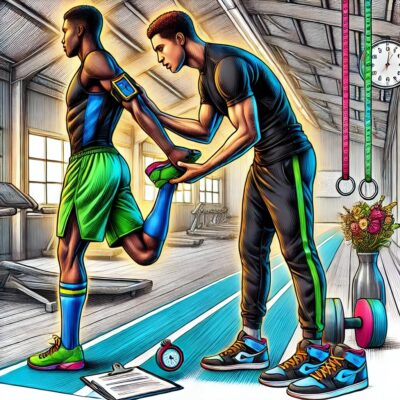Athletic trainers specialize in preventing, diagnosing, and treating injuries related to physical activity, working closely with athletes to ensure their safety and optimal performance.
What is a typical day as an Athletic Trainer?
– Conducting physical assessments and developing injury prevention strategies
– Observing athletes during practice and competitions to assess their strengths and weaknesses
– Providing first aid or immediate care for sports injuries during practices or competitions
– Designing and monitoring rehabilitation programs for injured athletes.
– Educating athletes and coaches on proper techniques to avoid injuries.
What else might they be expected to do?
– Collaborate with physicians, physiotherapists, and sports coaches to create treatment plans
– Maintain records of athletes’ injuries, treatments, and recovery progress
– Stay updated on advancements in sports medicine and rehabilitation techniques
What type of training is needed for this career path?
– A degree in Athletic Training, Sports Medicine, or a related field is essential.
– Certification from recognized organizations such as the National Athletic Trainers’ Association (NATA) or equivalent local bodies is highly recommended.
What kind of personality is needed to excel in this career path?
– Compassionate, detail-oriented, and quick-thinking individuals thrive in this role.
– Big 5 traits: Conscientiousness and Emotional Stability.
– Myers-Briggs types: ISFJ or ISTP align well with this career.
What challenges can I expect to face if I pursue this career path?
– Managing the physical and emotional demands of working with injured athletes
– Handling high-pressure situations during competitions
– Staying current with sports medicine developments and certifications
What are the job prospects for this path in Kenya and Africa? What about International prospects for a Kenyan citizen?
– Kenya and Africa: Opportunities in sports academies, professional teams, and physiotherapy clinics. The growth of sports industries like athletics and rugby boosts demand.
– International: High demand in global sports organizations, professional leagues, and colleges.
What should I focus on if I choose to pursue this career?
– Build expertise in injury prevention, treatment, and rehabilitation techniques.
– Develop strong interpersonal skills to build trust with athletes.
– Stay updated on new technologies in sports medicine, such as wearable monitoring devices.
Which other careers or job roles can I progress to?
– Sports Physiotherapist
– Strength and Conditioning Coach
– Sports Medicine Specialist
– Rehabilitation Coordinator

